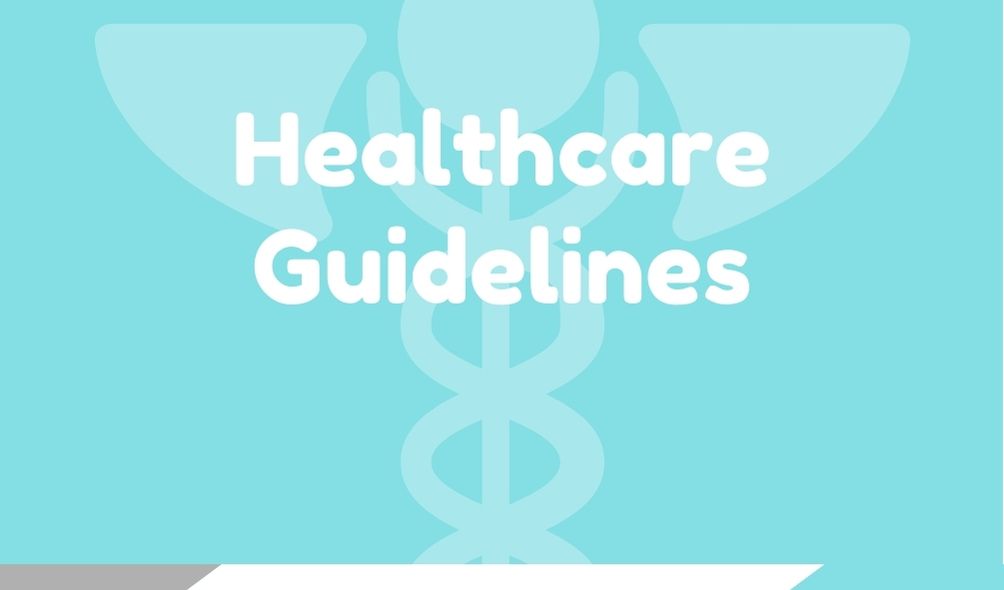Login
Signup
Healthcare Guidelines
- Home -
- Healthcare Guidelines

Individuals with Down syndrome (DS) need the usual health care screening procedures recommended for the general population. For example, children with DS need the usual immunizations and well child care procedures as recommended by the American Academy of Pediatrics. Immunization practices are continually evolving: be certain to use the most up-to-date protocols.
Similarly, adults with DS should have health evaluations using the standard accepted practices. However, children with DS have an increased risk of having certain congenital anomalies. Both children and adults may develop certain medical problems that occur in much higher frequency in individuals with DS. The Healthcare Guidelines should serve as a checklist of additional tests and evaluations recommended for children and adults with DS. These recommendations should take into consideration available local expertise and referral patterns. They are based on our present level of knowledge and should be modified as new information becomes available. Modern primary health care includes educational and developmental concerns within its domain, and therefore we have included information and recommendations specific to these needs of individuals with DS.
These recommendations are a thoughtful composite of the input of many clinicians involved in the care of people with DS. They reflect current standards and practices of health care in the United States of America. They have been designed for a wide audience: for health care professionals who are providing primary care, such as pediatricians, family physicians, internists, and geneticists, as well as specialists, nursing personnel and other allied health professionals, such as physical and occupational therapists, speech-language pathologists, and audiologists. In addition to educators and early intervention providers, these guidelines are designed for parents and other caregivers to use with the professionals who participate in the care of the individual with DS.
Certain recommendations are clearly supported by current scientific knowledge. This is the case for the recommendations to look for the presence of congenital heart disease, which occurs in some 50% of infants with DS. In other cases, the recommendations represent our educated guesses. Recognizing the increased frequency of thyroid dysfunction in children with DS, we continue to recommend yearly screening for hypothyroidism. However, we are uncertain as the appropriate periodicity and nature of the screening: how often, and what constitutes an adequate screening. This question, and others, will be answered by the anticipated development of a large-scale clinical database.
Be certain to use the specific DS growth charts in addition to regular charts to record height and weight (for children from birth to 18 years of age), and head circumference (for children birth to 36 months of age).4 If a child is below the third percentile, or if falling off the expected percentiles, consider congenital heart disease, endocrine disorders (thyroid or pituitary), or nutritional factors. Because children with DS have a tendency to become overweight, always use the “Weight v. Height” plots on the growth charts for typically developing children; this will give a more realistic picture of appropriateness of a child’s weight.
Healthcare Guidelines
Infancy (Birth to 1 year)
- Perform complete physical and neurological exam to detect congenital anomalies
- Perform chromosome analysis (karyotype)
- Provide genetic counseling, including a discussion of recurrence risk
- Screen for thyroid dysfunction (sensitive TSH) at 6 months and 1 year
- Assess cardiac function (echocardigram)
- Screen for hematologic cancers (CBC)
- Screen hearing at birth (otoacoustic emission (OAE) or brainstem auditory evoked response (BAER))
- Check eyes for strabismus, cataracts and nystagmus by 6 months (clinical examination by primary care provider, or refer to opthalmologist)
- Refer to an oral health professional for evaluation and recommend an oral health assessment by age1.
- Schedule routine immunizations, including those for hepatitis B, influenza, and pneumococcal disease
- Refer to early intervention programs and Down syndrome/disability support groups
- Discuss the possibility of SSI enrollment
Early Childhood (1 to 5 years)
- Screen for thyroid dysfunction (sensitive TSH) annually
- Assess hearing annually
- Assess vision annually
- Reassess cardiac function annually
- Recommend well-balanced, high fiber diet
- Recommend the establishment and communication about an oral health care plan, including the engagement of caregivers in daily disease prevention practices as needed.
- Recommend and arrange for annual dental care exams and cleanings and caries risk assessment as needed (note: children with congenital heart) disease should receive antimicrobial prophylaxis before dental procedures
- Monitor school placement
- Monitor speech and language progress
- Play program for socialization and exercise
Late Childhood (5 to 13 years)
- Screen for thyroid dysfunction (sensitive TSH) annually
- Reassess vision annually
- Reassess hearing annually
- Monitor height and weight, discuss obesity risk
- Assess self-care skills
- Obtain cervical spine film (lateral x-ray of neck in flexion and extension) to rule out atlanto-axial instability
- Monitor for obesity
- Monitor school progress
- Monitor speech and language progress
- Monitor oral health status, caries risk, and nutrition
- Encourage active play and regular exercise and participation in sports
Adolescence (13-18 years)
- Screen for thyroid dysfunction (sensitive TSH) annually
- Reassess vision every 2 years
- Reassess hearing every 2 years
- Watch for signs of atlanto-axial instability
- Discuss sexuality and socialization
- Recommend regular exercise and nutrition counseling
- Monitor oral health status and caries risk
- Monitor for obesity
- Reinforce importance of self-care skills
- Discuss long-term financial plans
- Discuss alternative community living resources
- Monitor prevocational training
- Discuss community-supported employment opportunities
Adulthood (18 years and over)
- Screen for thyroid dysfunction (sensitive TSH) annually
- Reassess vision every 2 years
- Reassess hearing every 2 years
- Recommend regular exercise and nutritional counseling
- Monitor for obesity
- Monitor for behavioral changes/loss of skills
- Monitor for mental health problems
- Monitor oral health status and caries risk
- Monitor for symptoms of dementia, including Alzheimer’s disease
- Monitor vocational activities